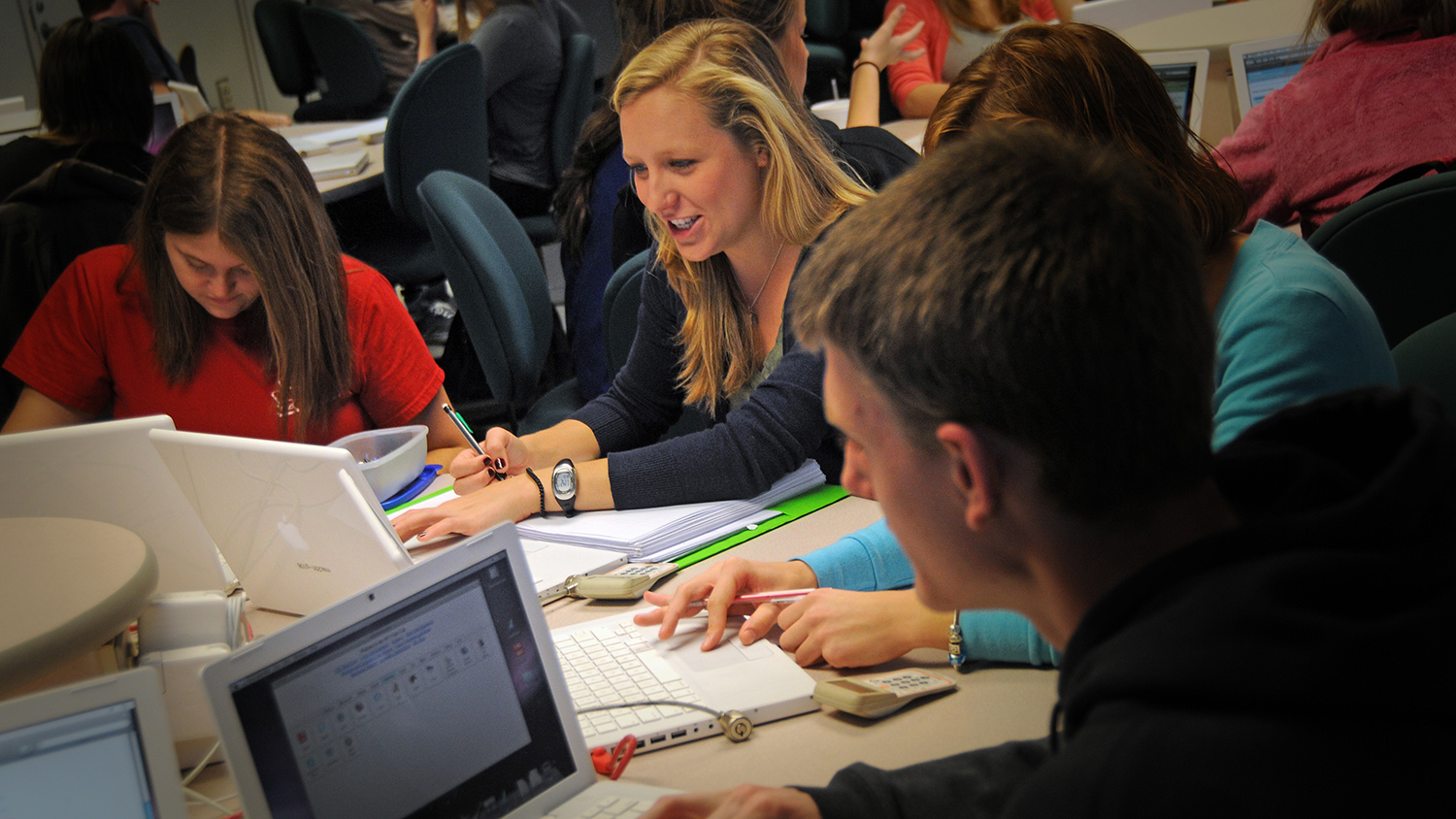Pack Hacks for Faculty: Two-Stage Collaborative Exams

Welcome back to Pack Hacks for Faculty. Each month, a member of the NC State faculty will provide quick tips, advice and other insight to facilitate your teaching, research, scholarship or engagement activities. If you are interested in making a submission for a future Pack Hacks for Faculty, please review our submission guidelines and contact provost-communications@ncsu.edu if you have questions.
This month, Lisa Falk, a teaching assistant professor in the Department of Marine, Earth and Atmospheric Sciences, talks about how switching to two-stage collaborative exams benefits both faculty and students.
Two-stage Collaborative Exams: One Simple Change, a Multitude of Benefits
 Midterm exam season is upon us. You can practically smell the test anxiety wafting from the study rooms of the libraries. It’s not much better for faculty. Grading a single exam consumes hours upon hours, at the end of which we may be left feeling that students have fallen short of demonstrating their true skill level, or worse, that we have fallen short in facilitating the acquisition of those skills. Exams aren’t fun for anyone. At least they weren’t for me, until I made one simple change that improved student performance, reduced test anxiety, increased engagement and slashed my grading time: replacing my standard exams with two-stage collaborative exams.
Midterm exam season is upon us. You can practically smell the test anxiety wafting from the study rooms of the libraries. It’s not much better for faculty. Grading a single exam consumes hours upon hours, at the end of which we may be left feeling that students have fallen short of demonstrating their true skill level, or worse, that we have fallen short in facilitating the acquisition of those skills. Exams aren’t fun for anyone. At least they weren’t for me, until I made one simple change that improved student performance, reduced test anxiety, increased engagement and slashed my grading time: replacing my standard exams with two-stage collaborative exams.
How Two-stage Collaborative Exams Work
In a two-stage collaborative exam, students first take the exam individually, turn in their answers, then form small groups and immediately re-take the same exam (possibly with the addition of a few more challenging questions) to submit a single team response. By engaging in lively discussion to come to a consensus for their team’s answer, students receive immediate feedback about their reasoning. The grade each student receives is a combination of their individual score and the group score.
Last semester, I converted the exams for my large, introductory Earth Systems Science class (MEA100) to this format. I reduced the number of questions on the exam to allow time for discussion, and moved all the open-ended, free-response questions to the group portion of the exam. I was motivated to make the change largely to provide more timely feedback to students, but the benefits of group exams extend well beyond that.
Outcomes and Benefits
- Reduced test anxiety during exam
Students are inherently anxious about exams, which can seriously hinder performance. Two-stage group exams can help. Seventy percent of my students reported that the group exam format reduced the anxiety they felt about that particular exam. - Improved performance
Students also overwhelmingly reported (90 percent) that they felt the two-stage group exam format improved their ability to demonstrate and apply the knowledge and skills they had attained in the course. Those perceptions were backed up by the exam results as well:- Seventy percent of the group grades on the multiple-choice exceeded the highest grade of any individual team member. Teams were not riding the coattails of a single individual.
- When the majority of individuals in a group got a multiple-choice question wrong, the group was still able to arrive at the correct answer 71 percent of the time. Group discussion allowed students to think critically and re-evaluate their initial conclusions.
- The answers on the free response questions were much higher quality than previous semesters. Students were able to integrate fundamental concepts from across different modules and transfer their learning to new contexts at a level I had rarely seen in individual free response answers before. Group discussion allowed students to refine their reasoning, make new connections, and think more creatively.
- Intellectual and emotional engagement with course content
When their grades depend on arriving at a consensus answer, students are invested in both defending their ideas and re-examining their assumptions though spirited and often noisy discussion. Of course, not all of the noise in the room is strictly on-topic. During the group exam in my Earth Systems Science class, I occasionally overheard conversations veering off on tangents ranging from personal lifestyle choices to career aspirations to national politics. That’s not a bad thing: I want my students making connections between Earth science and the choices they make as consumers, professionals and citizens! - Shorter grading time
By having student work on the free response questions in groups, I reduced the number of exams I needed to grade by hand from 92 to 31. The answers were more clearly reasoned, so assessment was simpler. And groups could delegate the actual writing to a person with legible handwriting!
Collaboration Throughout the Learning Process
Before you make the switch to two-stage collaborative exams, make sure that you’ve laid a foundation by integrating collaboration throughout the learning process. Luckily, this doesn’t necessarily require radically restructuring your classroom activities. For a start, try incorporating Think-Pair-Share questions into your lectures. In this active learning strategy, the instructor poses an open-ended question, allows students time to formulate their ideas individually, then has students pair up to discuss their reasoning, before opening discussion to the whole class to share the ideas they’ve gathered.
This low-barrier modification to lectures will allow students gain confidence sharing their ideas in small groups and set the stage for two-stage collaborative exams. By the time your next exam rolls around, you’ll be one small change away from reduced test anxiety, improved student performance, and sweet relief from the exam-grading crush.
Lisa Falk is a teaching assistant professor in the Department of Marine, Earth and Atmospheric Sciences in the College of Sciences. She can be reached at esfalk@ncsu.edu.
- Categories:



The overall concept is something many students would support. I, myself, would support it, but I also think that this exam-taking method raises a few questions / concerns.
WHY I SUPPORT IT:
Many group projects assigned in courses usually receive a weight of 10 – 30% of a student’s grade. Although, this is not the same as a ‘group project’, the group dynamic that one person does not have to know it all, is still there. If the weight of the exam isn’t increased just because it is a group exam, then the effect on a student’s grade is still ‘fair game’. I also think that this may allow for more complex long-response questions that may be managed with more cognitive resources (multiple students). By solving at least 1 complex question during the exam students are acting on real-world capacities, because problem-solving in many fields may require the cooperation and collaboration of several individuals.
QUESTIONS RAISED / CONSIDERATIONS:
Reduced anxiety is noted as an outcome/benefit. I believe this is situational, but I am wondering if there is research (likely behavioral research) that indicates if a student has positive test taking experiences (because of group exams) are they likely to experience less anxiety when they must take an exam as an individual.
This raises another concern: ‘Group exams’ aren’t a norm in almost any field. Including teaching exams, etc. However, if professors limit this method to 1 exam per semester, I think the benefits of collaborative critical thinking, etc…. are there and students are still exposed to the stresses of individual exam-taking for the rest of the exams.
Overall, it is a noteworthy idea that I think many professors can / should implement it, but I would argue that this should not replace individual exam taking for concerns like the ones I raised. Especially, the fact that group exams are not societal norms.
In programming terms: I would consider group exams a new awesome feature, but wouldn’t want to label individual exams as a ‘bug’ that needs to be fixed.
Respectfully,
Ernesto
Hi Ernesto,
I have a little bit of data regarding the question of whether when a “student has positive test taking experiences (because of group exams) are they likely to experience less anxiety when they must take an exam as an individual”, which would indicate the answer is No. In my classes, consistently over 30% of students indicate that statements corresponding to high test anxiety on the Motivated Strategies for Learning Questionnaire (MSLQ) are very true of them, and mid-semester and end-semester surveys indicate test anxiety only increases as the semester progresses. That trend remained pretty much the same in the semester I implemented group exams as in the previous semester with no group exams.
I wouldn’t say we should discard individual exams entirely either, but as a counterpoint, it is pretty rare in the “real world” to be placed in a high stakes situation where you are unable collaborate or access outside resources. So how useful are individual exams as a measure of a person’s abilities to apply their skills and knowledge?
Admittedly, the direct advantages to students (reduced anxiety, immediate feedback from peers, accessing “more cognitive resources (multiple students)”) are only part of the reason I favor group exams. If I can cut my grading time from 18 hours to 5 hours, I can use that time to support my students’ learning in other ways.
Regards,
Lisa